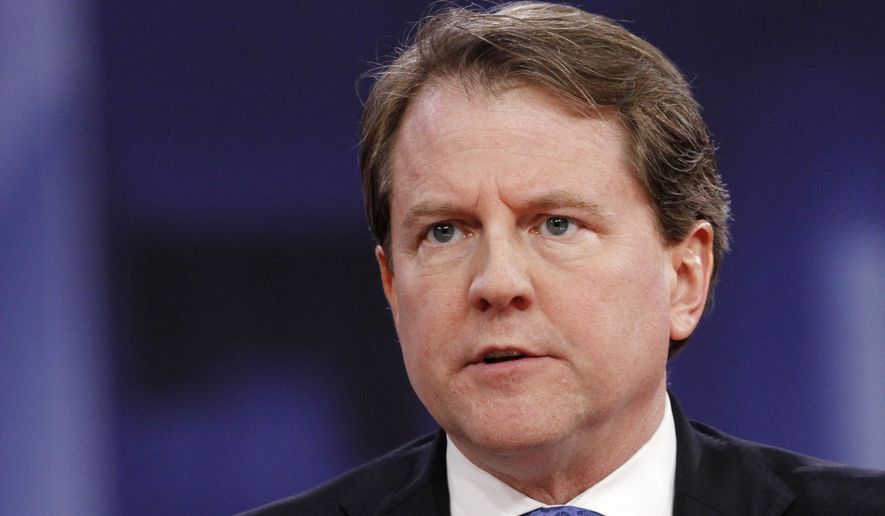House Democrats on Friday will demand a federal court to compel former White House counsel Don McGahn to testify in the impeachment inquiry, testing the limits of executive power to defy Congress.
Attorneys for the House Judiciary Committee also will ask for secret grand jury information from ex-special counsel Robert Mueller’s probe into Russian meddling in the 2016 election.
Oral arguments in both cases will be heard by partially overlapping three-judge panels in the U.S. Court of Appeals for the District of Columbia.
Democrats will argue it needs the grand jury information and Mr. McGahn’s testimony for a Senate trial or additional articles impeachment against President Trump.
The Justice Department, which is representing the administration in both cases, has argued that since Democrats have already moved ahead with impeachment, the courts should stay out of the fight.
The outcome of the McGahn fight could have a significant impact on future clashes between the executive and legislative branches.
Presidents of both parties have invoked immunity during fights with Congress but such disputes have rarely been decided by the federal courts.
“You have a couple of district court rulings, but it would nice to have the D.C. Circuit court weigh in on this. To have a D.C. Circuit Court ruling, which is the second most important court in the nation, is going to be a very important thing,” said Steven Schwinn, a professor at John Marshal School of Law in Chicago.
Judiciary Committee Democrats last year subpoenaed Mr. McGahn saying they wanted to hear about the president’s attempt to fire Mr. Mueller. They say the attempted removal of Mr. Mueller could amount to obstruction of justice.
Although one of the two articles of impeachment passed by the House last week was for obstruction of Congress, Mr. Trump has not been impeached on obstruction of justice charges.
Congress hasn’t explicitly ruled it out an obstruction of justice charge, according to a filing last week by Judiciary Committee attorney Douglas Letter.
He said if Mr. McGahn’s testimony shed new light on the president’s actions, more articles of impeachment could be approved.
“If McGahn’s testimony produces new evidence supporting the conclusion that President Trump committed impeachable offenses that are not covered by the Articles approved by the House, the Committee will proceed accordingly — including, if necessary, by considering whether to recommend new articles of impeachment,” wrote Mr. Letter.
“There is no requirement for Democrats put all of the articles of impeachment in one basket,” said Joshua Blackman, a professor at South Texas College of Law Houston. “In theory, they could do one at a time — a perpetual impeachment.”
The fight could drag on for months, even years, possibly outlasting the Trump administration.
The events of 2020 could also shape the battle. If Mr. Trump loses the 2020 election or his victorious coattails produce a Republican House majority, the case could be mooted.
Regardless, whatever the D.C. Circuit decides likely will be appealed to the U.S. Supreme Court. If the Supreme Court does grant review, they would not be expected to render a decision until after the 2020 election, probably not until June 2021 near the end of the next term.
“There are a number of ways this could fizzle out and there are a number of ways it could reveal additional information,” Mr. Schwinn said. “I think it’s really hard to predict.”
In November, a federal judge with a different court ordered Mr. McGahn to testify, declaring in a 118-page opinion that “presidents are not kings” and “no one is above the law.”
“However busy or essential a presidential aide might be, and whatever their proximity to sensitive domestic and national-security projects, the president does not have the power to excuse him or her from taking action the law requires,” U.S. District Judge Ketanji Brown Jackson wrote.
Compelling Mr. McGahn to testify may not give the Democrats what they want.
He could still appear before the panel and plead executive privilege on each question.
If that happens, his case could return to the courts to suss out privilege claims on each question.
“This all just a prelude, because it is about Mr. McGahn being allowed to show up,” Mr. Blackman said. “So the Democrats won’t be getting information any time soon.”
• Jeff Mordock can be reached at jmordock@washingtontimes.com.




Please read our comment policy before commenting.